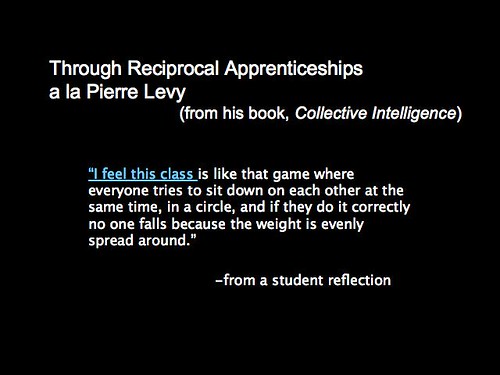.flickr-photo { border: solid 2px #000000; }
.flickr-yourcomment { }
.flickr-frame { text-align: left; padding: 3px; }
.flickr-caption { font-size: 0.8em; margin-top: 0px; }
It’s a real thrill to have Barbara Ganley here in Vancouver this week. I’ve long been blown away by her ability to go deeper when the the rest of us get caught up in going faster. And how richly she has conceptualized and articulated the potential for learning that can happen out on the open web — perhaps most infamously with the frame of “slow blogging“… She was also a shaker in what I honestly think was the most compelling and effective conference session I have been at in recent years.
So obviously I’m eager to experience what she lays down this Wednesday:
Both Sides Now: In Person and on the Web; Slow Learning Communities for Fast Times
The tensions between traditional and emerging forms of learning should be energizing, not paralyzing higher education. Harried and fearful of Nabokov’s reminder that “Curiosity is insubordination in its purest form,” we overlook the rich potential of positive deviance and failure; we forget that learning should be disruptive. In this discussion/workshop we will explore how creative dissonance, experienced through the vibrant interplay between face-to-face and online spaces, the rich borderland between old and new, leads us right now, right here to extraordinary, deep learning outcomes.
As you can guess from the abstract, we can all expect to be provoked in our assumptions. Along those lines, I think about this passage from her most recent post on (the new) bgblogging (which is a true epic):
I’m conflicted about the open-education movement, about MOOCs and online affinity groups and online communities. The openness is exemplary. The learning possibilities mind-boggling. The chance to even the playing field–open access to all–downright thrilling. But I also sense, as a natural outcome of networked individualism, an increasing movement towards the ME and away from the US, both online and off, towards polarization and insularity rather than expanded horizons and inter-cultural understanding. I’m concerned about Negroponte’s “Daily Me” . Participatory learning, both online and off, can help us counter this risk, by enabling us to bump into one another and other ideas if we work at it, in keeping with Sunstein’s Republic.om contention that “Unplanned, unanticipated encounters are central to democracy itself.”
The session is set for this Wednesday, October 1, 1:00 – 4:00 pm in the lovely Dodson Room at the Learning Commons, UBC’s Irving K. Barber Learning Centre, 1961 East Mall (please register if you’re coming, non-UBCer’s welcome).



I’d give a lot to have been in the audience for this one. When’s the video going up? Viva positive deviance!
I wish I’d been in Vancouver – Barbara is a thoughtful and insightful writer and it would have been great to hear her speak.
If they recorded her presentation, where is it? I couldn’t find it on the Irving K. Barber Learning Centre site.